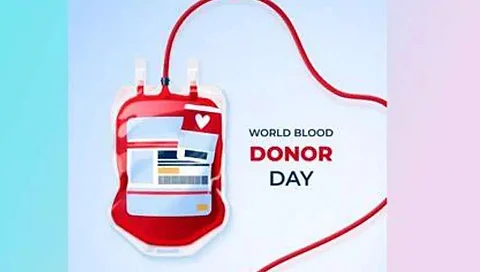
- Home
- Live Blog
- Breaking News
- Top Headlines
- Cities
- NE News
- Sentinel Media
- Sports
- Education
- Jobs

NEW DELHI: While donating blood is a selfless act and a humanitarian gesture, it also helps improve the donor’s health, said experts here on World Blood Donation Day on Wednesday.
World Blood Donation Day is celebrated around the world on June 14 to raise global awareness of the need for safe blood and blood products and to express gratitude for blood donors for their voluntary life-saving gift.
Healthy adults over 18 years of age can donate blood once every three months. Donating blood can help in the early detection of certain health conditions, such as anaemia or infectious diseases, which may otherwise go unnoticed.
Regular blood donation is also linked to lower blood pressure, helps maintain healthy iron levels in the body, and lowers the risk of heart attacks, the experts said.
“Blood donation has numerous health benefits for the donor. It reduces the risk of heart disease, lowers the risk of cancer, improves blood flow, leads to early detection of disease through health screening before donating blood, enhances psychological well-being, regulates iron levels in the body, and monitors your general health status,” Dr. Rajiv Tomer, Blood Bank, Ujala Cygnus Group of Hospitals, told IANS.
It is estimated that someone in India needs blood every two seconds. With India poised to become the most populous country in the world, access to safe blood is critical.
Over 12,000 people die every day in the country due to the non-availability of blood. In many cases, people who need transfusions do not have timely access to safe blood. This makes blood donation a life-saving exercise.
The theme this year is ‘Give Blood, Give Plasma, Share Life, and Share Often’. It holds tremendous relevance, especially for patients requiring lifelong transfusion support.
“Even a single person’s blood donation can make a large difference in the lives of individuals battling conditions like thalassemia, sickle cell disease, or certain types of cancer who depend on regular blood transfusions to sustain their health,” Dr. Kalpana Velaska, Senior Consultant and Head Transfusion Medicine, NH SRCC Children’s Hospital, told IANS.
“By donating blood and blood products, we offer these patients a lifeline, replenishing their depleted supply of red blood cells, platelets, granulocytes, stem cells, coagulation factors, etc. Moreover, plasma donations are crucial for patients who require specialised treatments like immunoglobulin therapies,” she added.
However, the experts also underlined the importance of safe blood transfusion practises. They stressed the importance of embracing screening technologies like nucleic acid testing (NAT), which is a crucial step towards ensuring the safety and integrity of our blood supply.
“The safety of blood needs immediate attention, and issues need to be addressed like transfusion-transmitted infections (TTIs), which come with blood transfusions, concerning the overall healthcare system,” Dr. Seema Sinha, HOD, Transfusion Medicine, Fortis Hospital Noida, told IANS.
“It is crucial to safeguard the health of those who depend on transfusions and medical treatments. Prioritising the mandatory implementation of such screening technologies, proper storage and transportation conditions are paramount in safeguarding the purity and safety of donated blood. By doing this, decision-makers can foster a resilient healthcare system for generations to come,” she added. (IANS)
Also Read: Donating blood is an act of solidarity
Also Watch: